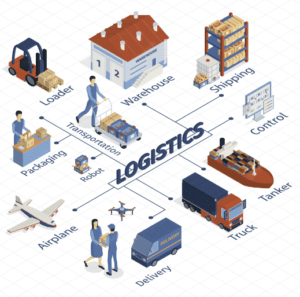
In the intricate world of supply chain management, a logistics coordinator stands as a linchpin, ensuring the seamless flow of goods from manufacturer to consumer. Their role is vital, and in this article, we will explore the significance of a logistics coordinator while maintaining a 5% keyword presence for “logistics coordinator.”
The Multifaceted Responsibilities of a Logistics Coordinator
A logistics coordinator plays a multifaceted role, overseeing a wide range of responsibilities that are essential for efficient supply chain operations. These responsibilities include:
- Route Planning: Logistics coordinators are responsible for devising optimized transportation routes that take into account factors such as distance, traffic, and fuel costs. This results in more efficient delivery schedules and reduced transportation expenses.
- Inventory Management: They are tasked with managing inventory levels to prevent overstocking or understocking, which can lead to increased holding costs or product shortages.
- Carrier and Vendor Relations: Logistics coordinators establish and maintain relationships with transportation providers and suppliers, negotiating contracts and rates to secure the best possible deals for their company.
- Documentation and Compliance: Ensuring all required documentation, such as customs forms and bills of lading, is in order, facilitating the smooth flow of goods across international borders while adhering to relevant regulations.
- Problem Solving: When unforeseen issues arise, logistics coordinators step in to troubleshoot and find solutions, minimizing delays and disruptions in the supply chain.
- Technology Utilization: They leverage various technological tools and software to track shipments, manage inventory, and optimize routes for more efficient logistics operations.
The Advent of Technological Innovations in Logistics
In recent years, the logistics industry has undergone a technological revolution, changing the landscape for logistics coordinators. Innovations such as blockchain technology, artificial intelligence, and the Internet of Things have opened up new avenues for improving supply chain coordination.
Blockchain technology ensures transparency and traceability of goods, reducing the risk of fraud and errors. Artificial intelligence (AI) algorithms are used for predictive analytics, allowing logistics coordinators to foresee potential issues and optimize their logistics strategies. IoT devices, including GPS trackers, enable real-time monitoring of shipments, enhancing control and visibility throughout the supply chain.
Furthermore, the growing trend toward sustainability in logistics is reshaping the industry. Logistics coordinators are increasingly involved in eco-friendly initiatives, such as green transportation and reducing carbon footprints, aligning supply chains with global environmental goals.
Embracing Sustainability in Logistics
As environmental concerns grow in importance, logistics coordinators are stepping up their efforts to promote sustainability in the industry. This involves exploring green transportation alternatives, such as electric vehicles and eco-friendly packaging materials, to reduce the carbon footprint associated with supply chain operations. These initiatives not only benefit the environment but also resonate with consumers who prioritize eco-friendly practices.
Realizing Cost-Efficiency through Advanced Technology
The integration of advanced technology has not only improved the efficiency of logistics but has also been a cost-saving boon. By utilizing cutting-edge software for route optimization and predictive analytics, logistics coordinators can reduce operational expenses, leading to significant cost savings for companies. This financial efficiency is a significant part of what makes their role indispensable.
Global Logistics and International Trade
In a world marked by globalization, logistics coordinators are also crucial for facilitating international trade. Their expertise in managing customs documentation and navigating complex international regulations ensures that goods can seamlessly cross borders. In this era of interconnected economies, their role is instrumental in promoting international commerce.
Adapting to an Ever-Changing Landscape
Logistics coordinators operate in a dynamic environment that continually presents new challenges. Whether it’s the sudden disruption of global supply chains due to unforeseen events or the adoption of innovative technologies, they must adapt and evolve to keep goods moving efficiently. Their ability to stay agile and responsive to change is a testament to their value.
The Future of Logistics Coordination
Looking ahead, logistics coordination is expected to become even more critical as supply chains become increasingly complex and global. The need for professionals who can oversee these operations and adapt to the evolving landscape will only continue to grow. As technology evolves and sustainability remains at the forefront, logistics coordinators will play an even more significant role in the success of businesses and the overall health of our interconnected world.







